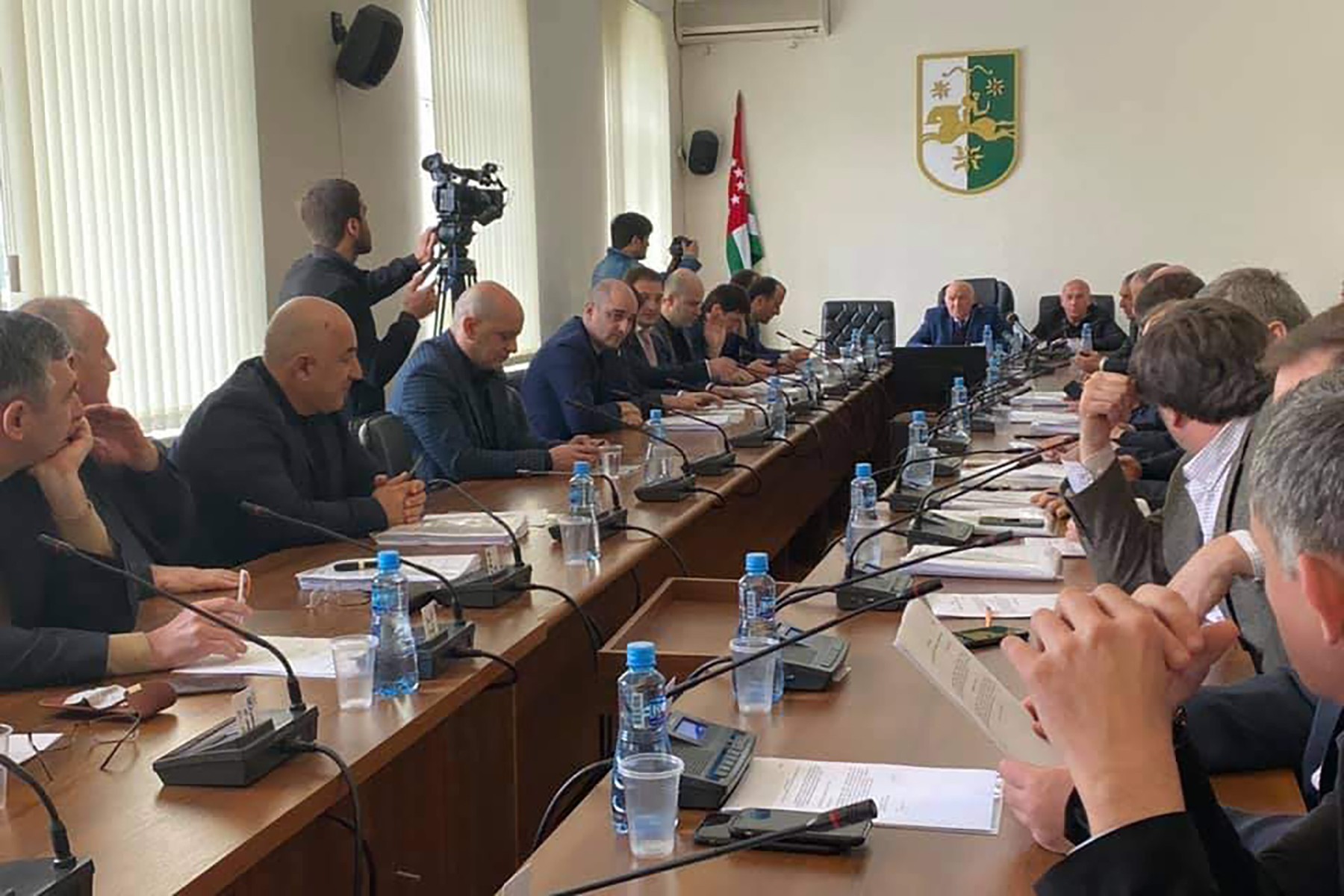
The Abkhazian parliament, the People’s Assembly, has passed long-fought-over anti-corruption legislation following a campaign by activists that culminated in 10 days of hunger strikes.
Twenty-four of parliament’s 35 MPs voted in favour of the measures on Thursday, just 10 days before early presidential elections, with none voting against.
The changes come as Abkhazia faces a number of pressing issues, including allegations that opposition presidential candidate Aslan Bzhaniya was poisoned for a second time and the dangers of the coronavirus spreading to Abkhazia.
Following the amendments on 12 March, Prime Minister and acting President Valeriy Bganba banned mass events and foreign trips for civil servants until 7 April to prevent the spread of the virus in Abkhazia.
The amendments to the Law on Financial Declaration of Public Officials would oblige all public officials to declare the income and property of their relatives, including children, parents, and siblings.
According to changes a month earlier, this only included spouses and children below the age of 18.
Financial declarations will be published on the website of the Ministry for Taxes and Fees, MPs and presidential candidates will also be required to submit financial reports to the Central Election Commission.
The new law would include not only real estate but also assets in banks and the value of precious stones and other artefacts.
The amended law would mean civil servants would lose their jobs and be banned from employment in the public sector if they fail to declare all the required information or provided false information.
Before the vote, several MPs including Speaker Valery Kvarchiya criticised the proposed draft as something that would not work and which contradicted other laws. MP Givi Kvarchiya called protests calling for the law an ‘application of Orange [Revolution] methods of pressuring the power’.
Ukraine’s 2004–2005 Orange Revolution has been widely portrayed in Russian Government circles as being sponsored by Western intelligence agencies.
The law was passed a day after five protesters on Freedom Square, in the capital Sukhumi, ‘temporarily’ suspended their hunger strike, after several MPs visited them and promised to introduce the changes.
The hunger strike was started by three activists on 2 March. The group, calling themselves the Initiative Group for the Ratification of Article 20, were demanding that parliament bring Abkhazian legislation in line with Article 20 of the UN Convention Against Corruption, which criminalises ‘illegal enrichment’ by public officials.

The group of MPs visited protesters on 11 March following calls to respond to their grievances from the Public Chamber of Abkhazia, an advisory body to the president, and the Union of Journalists of Abkhazia.
On 10 March, acting President Valeriy Bganba asked Foreign Minister Daur Kove to initiate and send a proposal to his office and to Parliament for Abkhazia to ‘unilaterally join’ the UN Convention.
Only five UN member states, including Russia, recognise Abkhazia as an independent state, with the rest of the international community recognising it as Georgian territory.
From an online campaign to pickets and hunger strike
The campaign to pass the law restarted in February as anti-corruption campaigners set up tents outside the parliament building in Sukhumi. The tents were quickly removed by police on 5 February.
A day later, Abkhazian lawmakers adopted an amendment to the law but this fell short of protesters’ demands and protests continued.
Activists, who have campaigned for the changes for two years, said they were frustrated that the changes would not come into force until the end of December 2020. MPs had said they needed the time to make amendments to another law — the Law on State Civil Service.
Astamur Kakaliya, the leader of the campaign, called this an ‘excuse’ to protract the process.
Kakaliya ran for president last summer on an anti-corruption platform but garnered only 1% of the vote, coming last among nine candidates.
On 11 March, several hundred people gathered on Freedom Square to support the anti-corruption initiative group, whose members were on their 10th day of hunger strike.
The draft law passed its first hearing in parliament last year, but after the February 2019 changes, it was shelved as lawmakers failed to agree whether all civil servants should have to declare their property.
By the time the hunger strike was suspended on Wednesday, activists claimed to have gathered over 10,000 signatures in support of their cause.

All three registered candidates for March’s presidential election have expressed support for the reforms.
According to protesters, two of them, Adgur Ardzinba and Leonid Dzapshba, visited put their signatures to the petition.
Tackling corruption — along with fighting organised crime, exploration of oil, and ownership of the Enguri (Ingur) Hydroelectric Power Plant — was one of the key issues during the presidential campaign last year.
For ease of reading, we choose not to use qualifiers such as ‘de facto’, ‘unrecognised’, or ‘partially recognised’ when discussing institutions or political positions within Abkhazia, Nagorno-Karabakh, and South Ossetia. This does not imply a position on their status.









